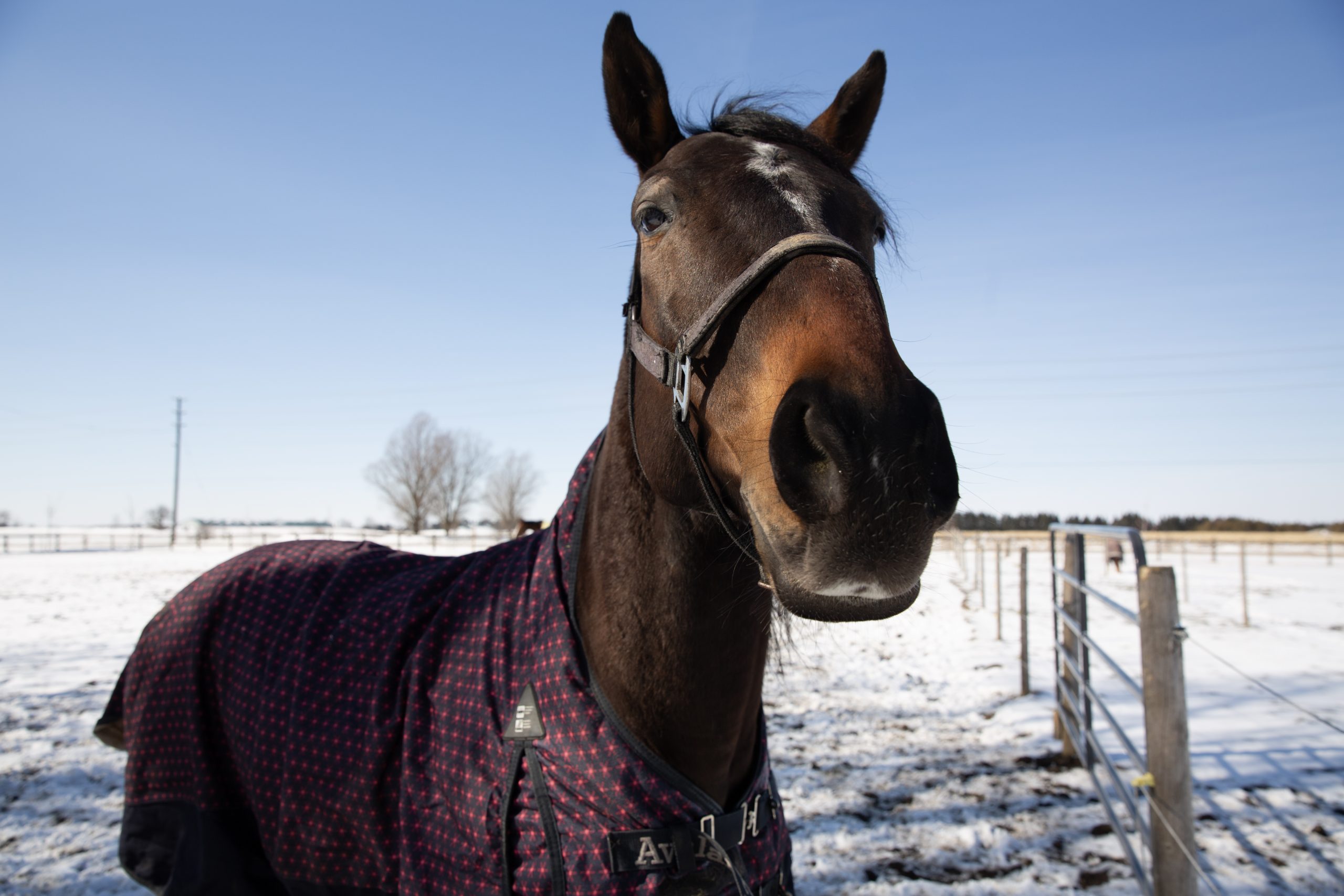GUELPH – February marks Equine Guelph’s Colic Prevention Education Month, colic being the number one killer of horses worldwide.
Fortunately, the majority of colic cases are mild and can be resolved with straightforward medical treatment and, occasionally, without specific intervention at all.
Dr. Nicole Weidner is the education programs officer at Equine Guelph. She focuses on the development and delivery of online courses and educational outreach related to equine nutrition and welfare.
She has an MSc and PhD in animal nutrition at the University of Guelph and her research examines links between nutrition and disease in animals, with a focus on vitamin D. Weidner is interested in scientific outreach and communication, especially relating to horse nutrition, health and welfare.
What is colic?
Weidner stated “colic is a term used to describe the visible signs of abdominal pain. However, it’s not a disease itself. It may help to think of it as describing a stomachache.
“We often recognize and refer to colic when a horse is rolling, thrashing, or pawing. These are all signs that a horse may be suffering from abdominal pain, however, the pain (or colic) may be caused by different things.”
She added other common signs of colic “include the horse stretching, looking at their flank, lying down, lip curling, teeth grinding, not eating, holding their head in an unusual position, sweating, changes in manure excretion (such as a decrease in the amount or change in consistency) and/or a change in urination.”
Equine colic, a term encompassing various gastrointestinal disorders in horses, remains a significant concern for horse owners and veterinarians worldwide. Colic episodes can range from mild discomfort to life-threatening emergencies, making prevention a top priority.
While multiple factors can contribute to colic, including age, breed and medical history, proactive management strategies focusing on diet, exercise, hydration and environmental factors play a pivotal role in reducing the risks.
“Causes of colic in horses include intestinal displacement, impactions, gas buildup, and parasitic infections,” Weidner said.
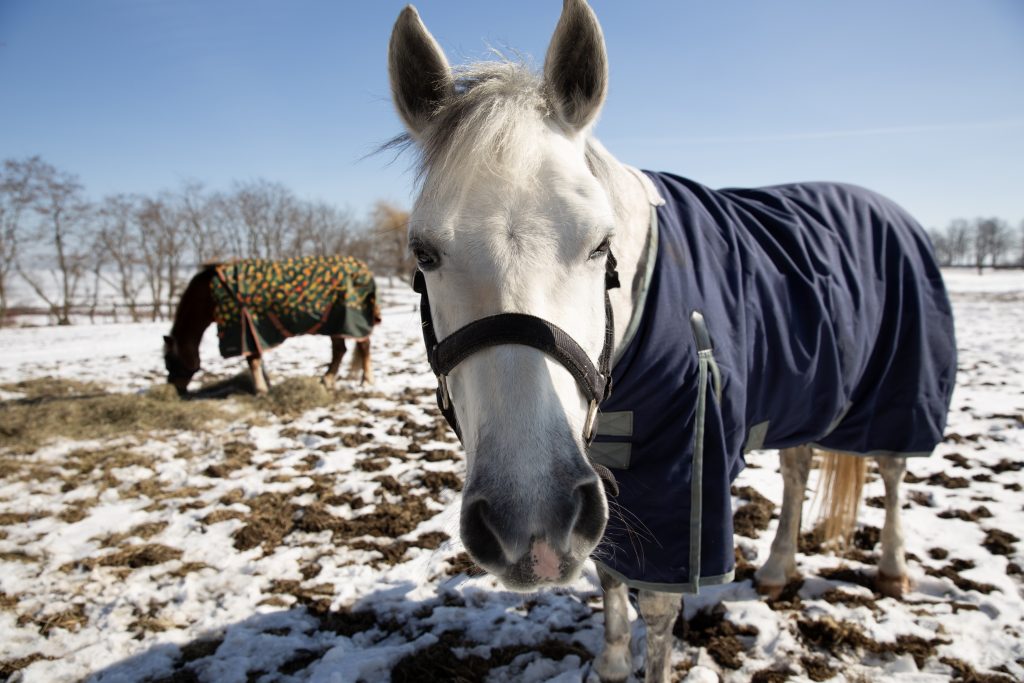
Junebug finds a warm spot to forage.
Diet
Dietary Management stands as a cornerstone in preventing equine colic. Providing horses with a balanced and appropriate diet tailored to their individual needs is paramount. High-quality forage, such as grass or hay, forms the basis of a horse’s diet, promoting digestive health.
However, the type and amount of forage should be carefully monitored to prevent issues like impaction colic, commonly associated with inadequate fibre intake. In addition to forage, proper supplementation of grains, concentrates and vitamins ensures horses receive essential nutrients to support optimal digestion and overall health.
Overfeeding or sudden dietary changes can disrupt the delicate balance of the gastrointestinal tract, leading to colic. Gradual transitions between feed types and regular evaluations of body condition scores are crucial components of effective dietary management.
“Horses should receive a forage-based diet, and forage should be available for them throughout the day and night. Horses that do not have enough forage in their diet, or that are only receiving poor-quality forage, will be at a higher risk of colic,” Weidner said.
“Horses receiving large amounts (more than five to six pounds) of concentrate feed in one meal have a higher risk of colic. If the horse requires a concentrate feed, then it should be divided into smaller meals instead of one large meal.”
Exercise
Experts say regular exercise plays a vital role in maintaining gastrointestinal function and preventing colic.
Physical activity stimulates gut motility, reducing the likelihood of impactions and other digestive disturbances. Incorporating a structured exercise regimen into a horse’s routine not only promotes cardiovascular fitness but also supports muscle tone and joint health, contributing to overall well being.
Engaging horses in varied forms of exercise allows for the development of strong abdominal muscles and proper posture, which are essential for optimal digestive function.
However, exercise intensity and duration should be tailored to individual fitness levels and health conditions to avoid overexertion, which can increase the risk of health complications.
“Horses with consistent exercise routines have been shown to have lower risk of colic, however changes in activity levels can increase the risk of colic,” said Weidner.
“This may be associated with changes in diet and stabling that often accompany a change in activity level.”
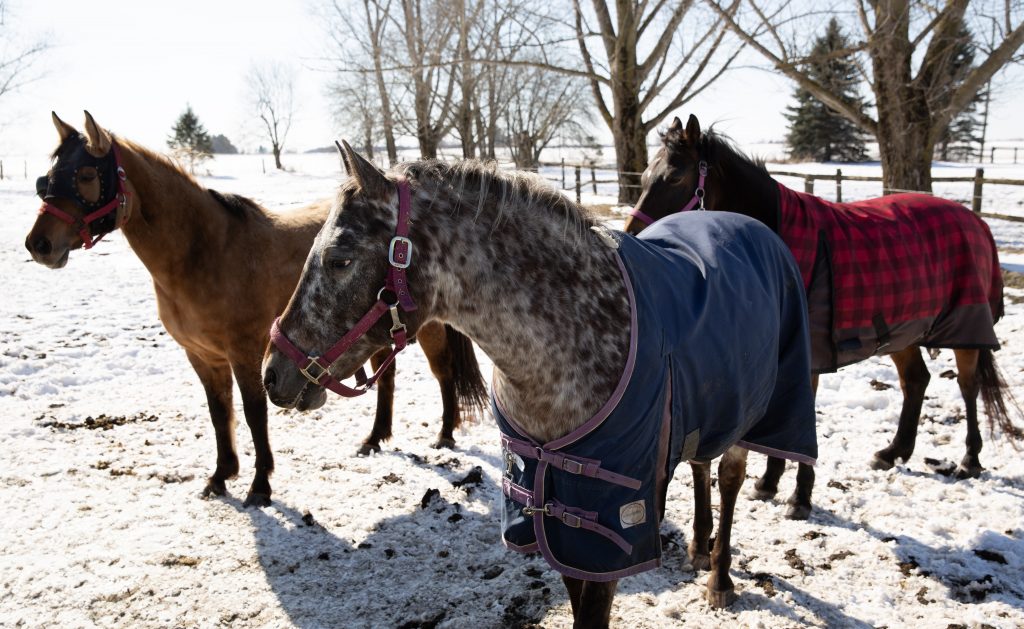
Horses are creatures of habit. Ensuring a regular routine is a must in preventing equine colic.
Hydration
Maintaining proper hydration is critical for horses. Adequate water intake is essential for softening ingested food, facilitating its passage through the digestive tract and preventing impactions.
During hot weather or periods of increased physical activity, horses may require additional water to compensate for fluid loss through sweat and respiration.
“Water is required for many different processes in the horse’s body – including keeping things moving through the horse’s digestive tract,” Weidner said.
“Horses that do not get enough water will have an increased risk of colic. Reduce the risk by making sure horses always have free access to fresh, clean water. This remains true in the winter – snow is not an appropriate source of water for horses.
“Offering loose salt can help ensure that horses are meeting their sodium requirement, which can help with their thirst response and ensure adequate water intake.”
Monitoring water consumption and promptly addressing any changes in drinking behaviour or water quality is an important part of day-to-day care for horses.
Environmental factors
Environmental management plays a crucial role in colic prevention by minimizing stress and hazards that can trigger digestive disturbances in horses. Providing a safe and stable living environment with suitable shelter and consistent feeding and exercise routines promotes mental and physical wellness.
Minimizing exposure to potential sources of stress, such as overcrowding or inadequate socialization helps maintain a harmonious atmosphere conducive to digestive health. Additionally, regular maintenance of pastures and stables, including removal of toxic plants, debris and other potential hazards, mitigates the risk of ingestion-related colic.
Weidner added sudden changes in weather may also increase the risk of colic.
“This link has not been fully explained, but it could be associated with other factors, like changes in how much water the horse is drinking,” she said.
“Monitoring your horse’s water intake and taking steps to ensure sufficient water intake during this time may help mitigate the risk.”
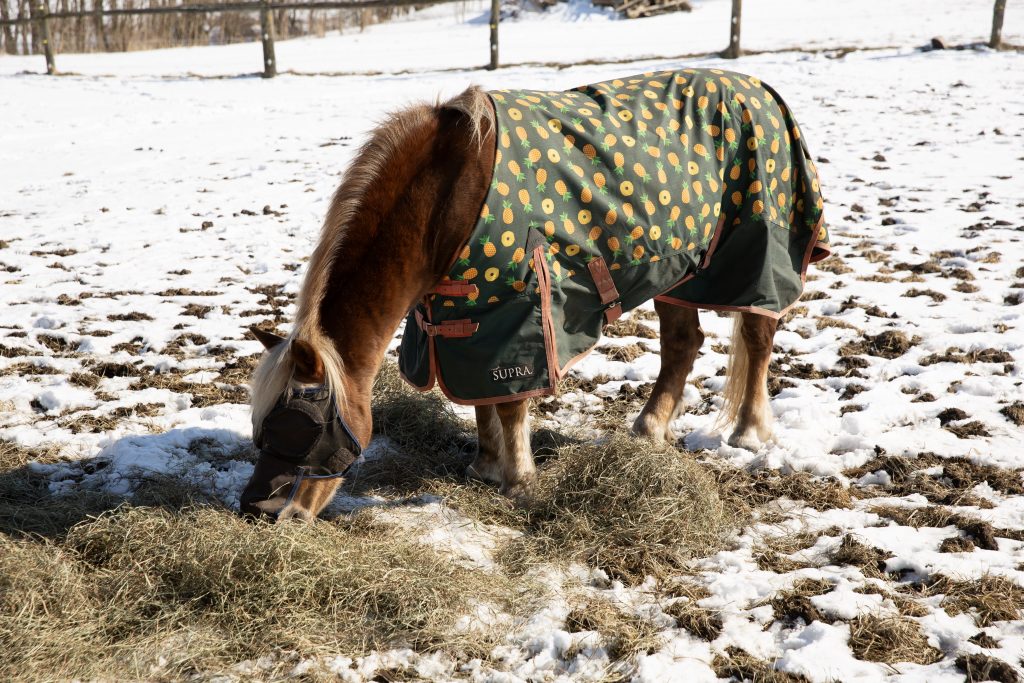
Molly grazes on some fresh hay while staying warm.
Preparation
According to Weidner, one of the best ways for horse owners to prepare for emergency situations related to colic is to develop an action plan that is specific to their horse, facility, veterinarian and situation.
“An action plan can help horse owners make decisions, act quickly, and remain as calm as possible when faced with an emergency,” she said.
“Some things to think about might include determining who your emergency vet is, knowing who can make decisions for your horse in your absence, knowing how much money you are prepared to spend, if your horse is a candidate for surgery, and being aware of what your insurance policy covers in cases of colic (if you have an insurance policy).
“The key to having the best outcome is to be prepared, act quickly and communicate with your vet. This is just one reason why it’s important to keep a good working relationship with your veterinarian.”
It’s a good idea to have a conversation with your current vet about how they would like you to prepare for emergency situations, as they will know your facility and horses best. It’s also important not to provide any medications to the horse without the consent of your veterinarian.
Equine Guelph offers a free heath check tool (thehorseportal.ca/healthcare-tools/horse-health-check) where caregivers can learn how to check their horse’s physical condition in order to have a better understanding of what is considered normal for their horse and to help flag abnormalities.
The program also offers a free colic risk tool (thehorseportal.ca/healthcare-tools/colic-tool/) for horse owners who are looking for more guidance on these topics.
Ongoing education and collaboration with veterinarians and equine professionals are essential for implementing effective colic prevention strategies tailored to the unique needs of individual horses.
By embracing a holistic approach to equine care, horse owners can strive towards minimizing the incidence of colic and fostering happier, healthier horses for future generations.
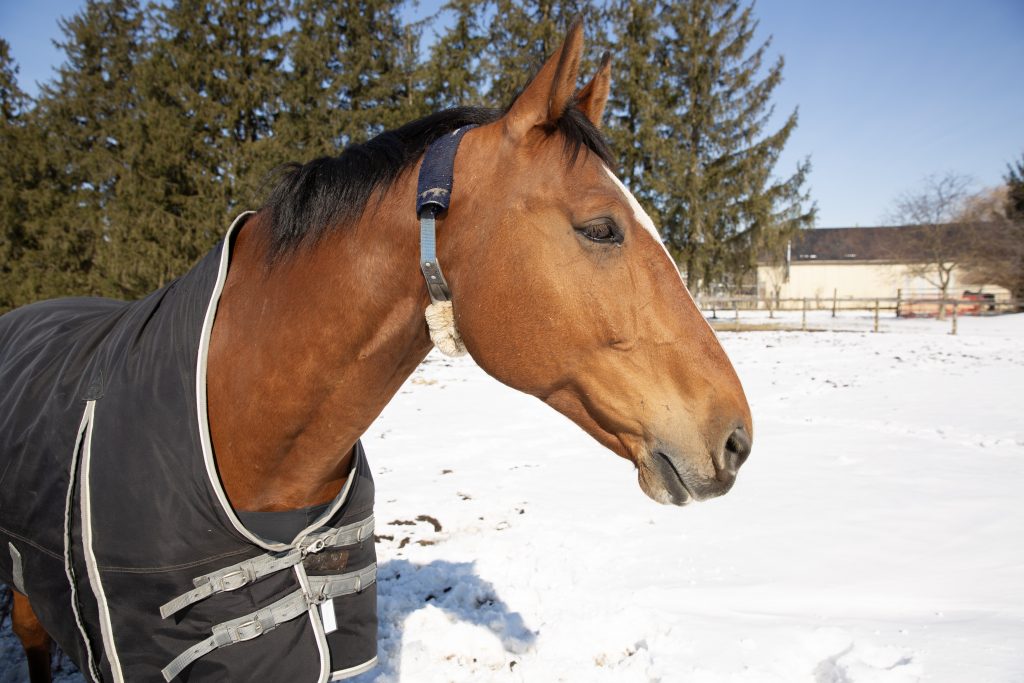
Elton enjoys the snowy outdoors during the day.




